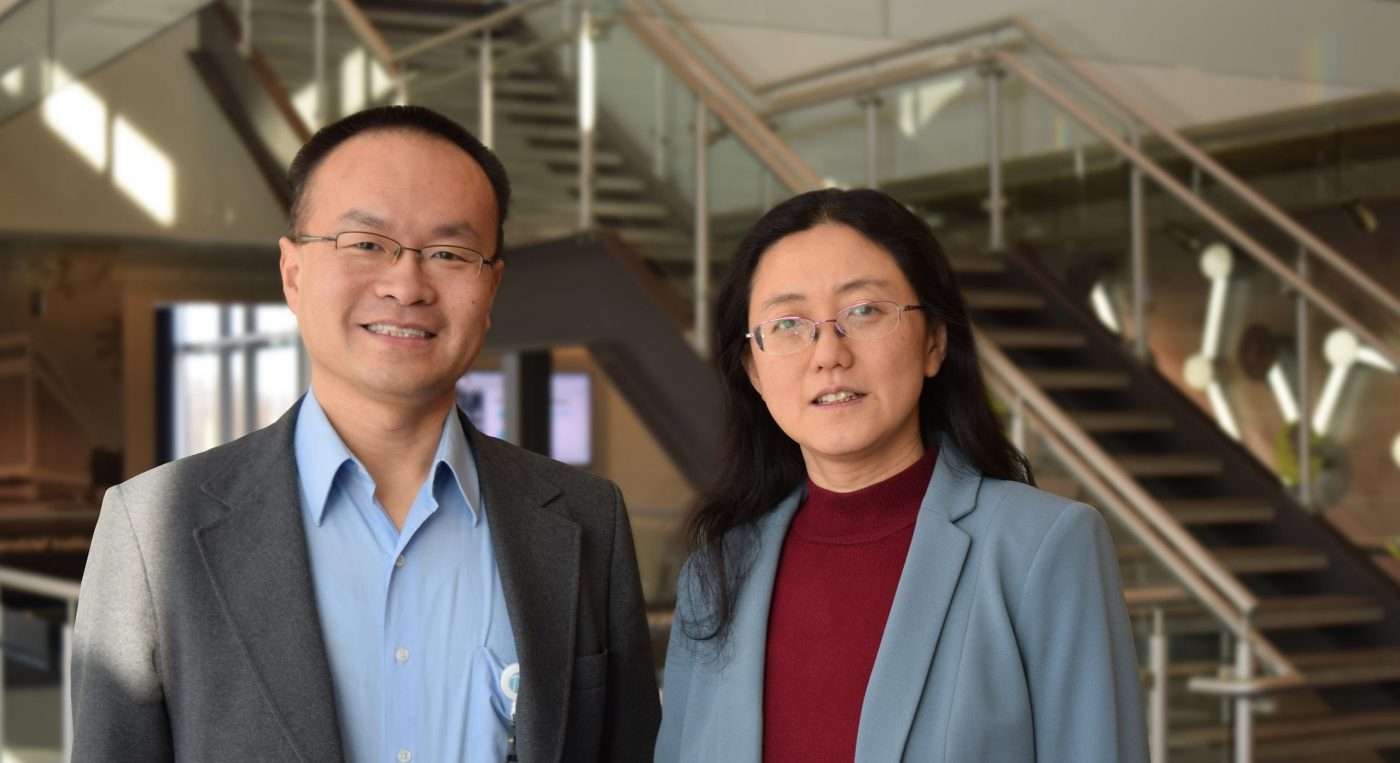Dr. Kun Huang (left) and Dr. Jie Zang (right)
Novel multi-omics data analysis AI framework outperforms existing methods
Genomics, proteomics, metabolomics, transcriptomics — rapid advances in high-throughput biomedical technologies has enabled the collection of data with unprecedented detail from the growing number of omics. But, how best to take advantage of the interactions and complementary information in omics data?
To fully utilize the advances in omics technologies to achieve a more comprehensive understanding of the biological processes underlying human diseases, researchers from Regenstrief Institute and Indiana, Purdue and Tulane Universities have developed and tested MOGONET, a novel multi-omics data analysis algorithm and computational methodology. Integrating data from various omics provides a more holistic view of biological processes underlying human diseases. The creators have made MOGONET open source, free and accessible to all researchers.
In a study published in Nature Communications, the scientists demonstrated that MOGONET, short for Multi-Omics Graph cOnvolutional NETworks, outperforms existing supervised multi-omics integrative analysis approaches of different biomedical classification applications using mRNA expression data, DNA methylation data, and microRNA expression data.
They also determined that MOGONET can identify important omics signatures and biomarkers from different omics data types.
“With MOGONET, our new AI [artificial intelligence] tool, we employ machine learning based on a neural network, to capture complex biological process relationships. We have made the understanding of omics more comprehensive and also are learning more about disease subtypes that biomarkers help us differentiate,” said Regenstrief Institute Research Scientist Kun Huang, PhD, who led the study. “The ultimate goal is to improve disease prognosis and enhance disease-outcome predictions.” A bioinformatician, he credits the diversity of the MOGONET research group, which included computer scientists as well as data scientists and bioinformaticians, with their varying perspectives, as instrumental in its development and success. He serves as director of data sciences and informatics for the Indiana University Precision Health Initiative.
The researchers tested MOGONET on datasets related to Alzheimer’s disease, gliomas, kidney cancer and breast invasive carcinoma as well as on healthy patient datasets. They determined MOGONET handily outperformed existing supervised multi-omics integration methods.
“Learning and integrating intuitive recognition, MOGONET could generate new biomarker disease candidates,” said study co-author Regenstrief Institute Affiliated Scientist Jie Zhang, PhD, a bioinformatician. “MOGONET also could predict new cancer subtypes, tumor grade and disease progression. It can identify normal brain activity versus Alzheimer’s disease.”
Drs. Huang and Zhang plan to expand this work beyond omics to include imaging data, noting the abundance of brain images for AD and cancer-related pathology images which can teach MOGONET to recognize even cases it had not previously encountered. Both scientists note that following rigorous clinical studies, MOGONET could support improved patient care in many areas.
In addition to Drs. Huang and Zhang, authors of “MOGONET integrates multi-omics data using graph convolutional networks allowing patient classification and biomarker identification” are Tongxin Wang, PhD, and Haixu Tang, PhD, of Indiana University, Wei Shao, PhD, of IU School of Medicine; Zhi Huang of IU School of Medicine and Purdue University; and Zhengming Ding, PhD of Tulane University. Dr. Wang worked in Dr. Huang’s laboratory. Dr. Ding, formerly of Indiana University, is an expert in the field of machine learning.
The development and testing of MOGONET was supported by National Institutes of Health grants R01EB025018 and U54AG065181 and the Indiana University Precision Health Initiative.
About Regenstrief Institute
Founded in 1969 in Indianapolis, the Regenstrief Institute is a local, national and global leader dedicated to a world where better information empowers people to end disease and realize true health. A key research partner to Indiana University, Regenstrief and its research scientists are responsible for a growing number of major healthcare innovations and studies. Examples range from the development of global health information technology standards that enable the use and interoperability of electronic health records to improving patient-physician communications, to creating models of care that inform practice and improve the lives of patients around the globe.
Sam Regenstrief, a nationally successful entrepreneur from Connersville, Indiana, founded the institute with the goal of making healthcare more efficient and accessible for everyone. His vision continues to guide the institute’s research mission.
About Indiana University School of Medicine
IU School of Medicine is the largest medical school in the U.S. and is annually ranked among the top medical schools in the nation by U.S. News & World Report. The school offers high-quality medical education, access to leading medical research and rich campus life in nine Indiana cities, including rural and urban locations consistently recognized for livability.
Kun Huang, PhD
In addition to serving as a research scientist at Regenstrief Institute, Kun Huang, PhD, is the assistant dean for data science, Precision Health Initiative professor of genomic data sciences, professor and vice chair of biostatistics and health data sciences, and professor of medicine at Indiana University School of Medicine.
Jie Zang, PhD
In addition to serving as a Regenstrief Institute affiliated scientist, Jie Zang, PhD, is an assistant professor of medical and medical genetics and a member of Center for Computational Biology and Bioinformatics at Indiana University School of Medicine.









